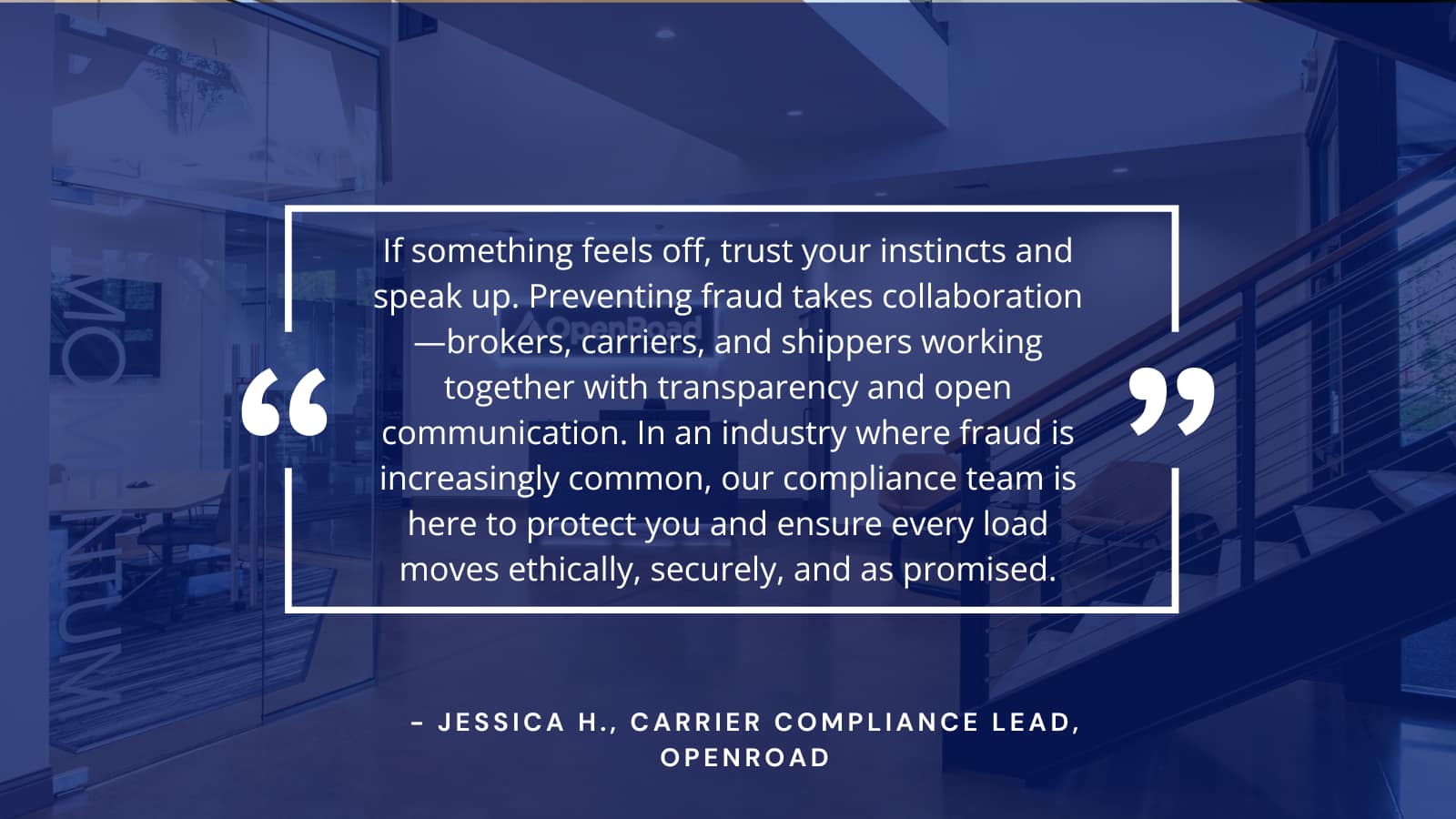Double brokering continues to be one of the most disruptive forms of fraud in the freight industry—and it’s on the rise. In this article, we’ll break down what it is, how to recognize it, and what steps you can take to help protect your business.
What is Double Brokering?
Double brokering occurs when a freight broker tenders a load to a carrier—but instead of hauling it, that carrier turns around and re-brokers the load to another carrier without the broker’s or shipper’s knowledge or permission.
While the original carrier may present themselves as fully qualified and ready to move the freight, in reality, someone else is doing the work—often without proper vetting or insurance in place. In many cases, neither the original broker nor the shipper has visibility into who is actually hauling the load, putting the shipment, timeline, and payment at risk.
Important distinction: Double brokering is not the same as co-brokering—though it’s often confused.
Legitimate co-brokering involves a transparent, contractual agreement between two licensed brokers to move freight together. In these rare cases, both parties should have written contracts, active lease agreements (when applicable), and up-to-date cargo insurance coverage in place.
What makes co-brokering legitimate is transparency: all parties involved—especially the shipper—are fully informed and in agreement from the start. Without that level of visibility and documentation, it’s not co-brokering—it’s likely unauthorized and potentially fraudulent activity.
Double brokering impacts every part of the supply chain—from shippers and brokers to carriers and factoring partners. No one wins. Even those attempting to double broker often lose, facing legal issues, payment holds, or permanent bans from load boards and freight networks.

Why Double Brokering is a Problem
Double brokering creates serious financial and operational risk across the supply chain—and when it happens, it’s usually the shipper or broker left holding the loss. In some cases, it’s the third-party carrier who unknowingly hauls the load and ends up unpaid or exposed to liability.
Without visibility into who is actually hauling the freight, liability increases, especially if the substituted carrier lacks proper insurance or qualifications. Loads may be delayed, lost, or involved in payment disputes, and the original contract terms are often violated. Even when fraud is discovered, recovery is rare, making prevention through strong vetting, real-time tracking, and clear agreements the best defense.
In the rush to spotlight stolen loads, we’ve overlooked the bigger problem: bad carriers hiding in plain sight. These aren’t one-time thieves… they’re repeat offenders who built fraud into their business model. …Freight fraud is a system built on distinct, traceable, and often preventable tactics.
— Danielle Chaffin, Freightwaves
Red Flags to Watch Out For
While double brokering schemes can be sophisticated, there are often warning signs. Some common red flags include:
- Limited Operating History: Carriers with little to no safety data, inspection history, or recent authority activation.
- Suspicious Communication: Use of generic email domains (like @gmail.com), inconsistent or misspelled contact info, VOIPs or VPNs , or a reluctance to provide clear communication.
- Unusual Payment Requests: Requests to change payment terms, reroute payments, or pay through unfamiliar channels.
- Load Visibility Issues: Carriers reposting your load on public boards, refusing to share driver/truck details, or making last-minute changes to pickup information.
- Tracking Gaps: Lack of GPS tracking or signs of manipulated location data on platforms like MacroPoint or 4Kites.
How OpenRoad Helps Protect You from Double Brokering
At OpenRoad, we take freight security seriously. Preventing double brokering starts with proactive, layered safeguards—and we’ve built our processes with that in mind. Here’s how we help protect your freight and your peace of mind:
- Thorough Carrier Vetting: We carefully vet every carrier we work with using trusted databases to verify authority, insurance, safety history, and performance records—and we don’t stop there. Our team continuously monitors carrier compliance to ensure standards are met on every load.
- Verified Contact Information: We never rely on what’s listed in an email or load board alone. Our team uses official sources to confirm legitimate contact and operating details.
- Clear Carrier Agreements: All of our carriers sign agreements that explicitly prohibit unauthorized re-brokering. If we work with co-brokers (rarely), it’s always transparent and fully documented.
- Rate and Activity Monitoring: We keep a close eye on unusual activity, including rate discrepancies and suspicious patterns that may indicate fraudulent behavior.
- Real-Time Visibility: Through tracking platforms and direct communication with drivers, we ensure you know who is picking up your freight—before it leaves the dock. Our operations team is actively involved in every shipment, calling and confirming each step of the journey.
- Pickup Verification Support: We coach our customers to verify carrier identity at pickup and ensure the correct information is documented on the BOL. If anything feels off, we’re just a call away.
Double brokering can have serious financial and operational consequences—but the good news is that with the right safeguards, much of it can be prevented. By staying vigilant, educating your team, and investing in vetting and visibility, you can significantly reduce your exposure to this type of fraud.
OpenRoad: Your Trusted Fraud Prevention Partner
At OpenRoad, we’re committed to being a proactive, transparent partner in that process. If you ever have questions about a carrier, notice something unusual, or just want a second opinion—reach out.
Let’s work together to protect your freight, your reputation, and your peace of mind.

